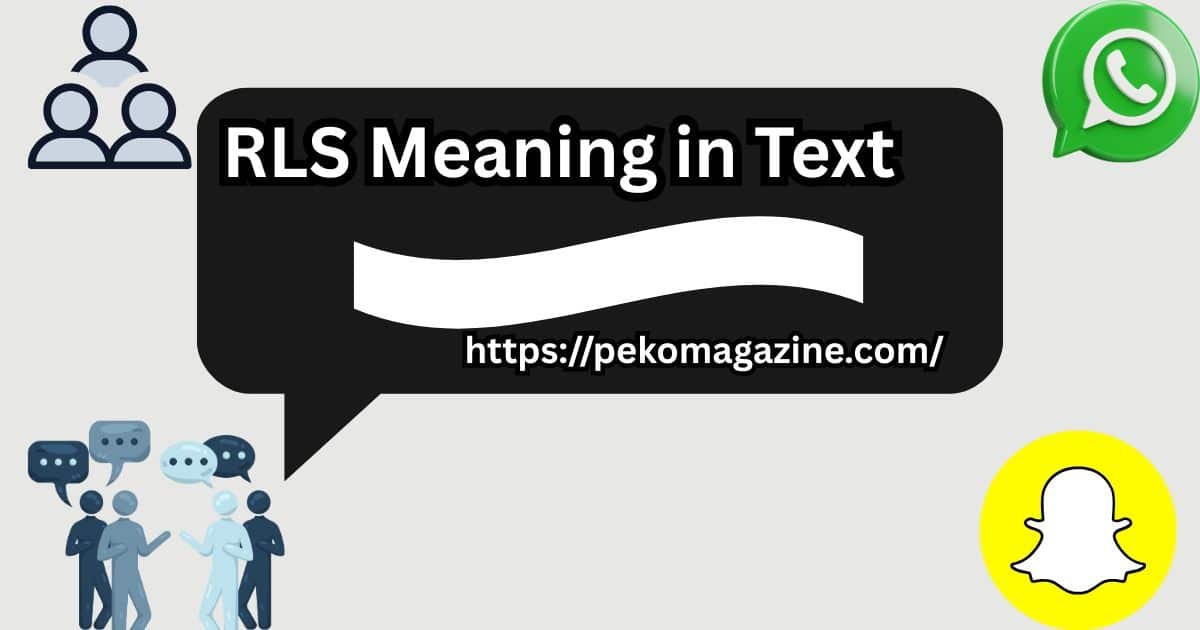Ever stared at your phone wondering what does RLS mean when someone drops it mid-conversation? You’re definitely not alone. This three-letter acronym pops up everywhere from dating apps to Discord servers, leaving millions scratching their heads.
Here’s the thing: RLS meaning in text isn’t always straightforward. Context matters more than you’d think. Sometimes it’s slang, sometimes it’s medical, and occasionally it’s something completely different.
This guide breaks down everything you need to know about what RLS means in text across different platforms, relationships, and situations. No fluff, just real answers.
Primary RLS Meanings in Digital Communication
“Real Life Shit” – The Dominant Definition
“Real Life Shit” dominates modern texting conversations. People use it when explaining why they can’t chat, game, or hang out online because actual life demands attention.
Think about it this way: your friend suddenly goes quiet during a gaming session. Twenty minutes later, they text “Sorry, RLS happened.” They’re basically saying real-world responsibilities crashed their digital party.
Common scenarios where you’ll see this usage:
- Gaming interruptions (most frequent)
- Social media breaks during work/school
- Dating app conversations that pause mid-chat
- Discord server explanations for sudden departures
The tone usually carries mild frustration or apologetic vibes. Nobody’s thrilled about leaving fun digital activities for mundane real-world tasks.
Medical Context: Restless Leg Syndrome
Restless Leg Syndrome represents the medical side of RLS usage. This neurological condition affects millions worldwide, causing uncomfortable leg sensations and irresistible movement urges.
When someone mentions RLS in health forums, support groups, or medical discussions, they’re talking about a legitimate condition. The context clues are usually obvious – mentions of sleep problems, medication, or doctor visits.
Key differences from slang usage:
- Appears in health-focused conversations
- Often accompanied by medical terminology
- Used by people seeking support or sharing experiences
- More formal tone compared to casual “real life shit”
Alternative Interpretations
Less common but worth knowing:
“Real Life Situation” – A cleaner version of the primary meaning. Parents, teachers, and professionals sometimes use this variation in mixed company.
“Really Loud Screaming” – Rare gaming context, usually describing intense moments in competitive play.
These alternatives pop up occasionally, but context makes their meaning clear. Gaming forums lean toward the screaming definition, while family group chats might use the situation version.
Context Clues: Reading Between the Lines
Understanding RLS meaning in text requires detective skills. Here’s your cheat sheet:
Gaming conversations = Almost always “Real Life Shit” Health discussions = Restless Leg Syndrome Professional settings = Probably neither (avoid using) Family group chats = Could be “Real Life Situation”
Time stamps matter too. RLS mentions during typical work hours (9 AM – 5 PM) usually reference real-world interruptions. Late-night RLS discussions might lean medical, especially in health-focused communities.
Age demographics influence interpretation. Gen Z and millennials default to the slang version. Older users might mean the medical condition or use alternative interpretations.
See Also: MMCHT Meaning in Text: Your Ultimate Guide to This Trendy Slang
Platform-Specific Usage Patterns
Social Media Platforms
Instagram Stories and DMs see RLS when people explain social media breaks. Someone might post “Taking a break, RLS calling” before disappearing for days.
Twitter/X threads use RLS for context switching. A user deep in political debate suddenly tweets “RLS interrupting, back later” when work demands attention.
TikTok comments feature RLS when creators explain upload delays. “Sorry for no videos, RLS been crazy lately” resonates with audiences dealing similar struggles.
Snapchat conversations employ RLS for sudden communication gaps. Your streak partner sends “RLS happened” explaining yesterday’s radio silence.
Messaging Apps
WhatsApp group chats embrace RLS for explaining absence. Someone drops “RLS emergency, can’t make tonight” in friend groups planning hangouts.
Discord servers practically invented gaming RLS usage. Players constantly explain sudden departures with quick “RLS, brb” messages before vanishing.
Dating app conversations see RLS when matches explain delayed responses. “Sorry, RLS kept me busy all week” attempts to revive dying conversations.
Professional vs. Personal Spaces
LinkedIn and work communications should avoid RLS entirely. The slang version sounds unprofessional, while medical references belong in healthcare discussions only.
Email usage rates as almost never appropriate. Stick to “personal matters,” “family emergency,” or “health issues” for professional communication.
Slack and team messaging tolerate occasional RLS usage in casual workplace cultures, but proceed carefully. Know your audience.
Response Strategies: What to Do When You See RLS
Immediate context assessment checklist:
- What platform are you on?
- Who sent the message?
- What were you discussing beforehand?
- What time did they send it?
Safe response options when unsure:
- “No worries, hope everything’s okay”
- “Take care of what you need to”
- “Catch you later”
- Simple emoji reactions (thumbs up, heart)
How to politely ask for clarification:
- “Everything alright?” (shows concern without demanding details)
- “Hope it works out” (acknowledges without prying)
- Wait for them to elaborate naturally
When to ignore vs. engage: Ignore: Random mentions in large group chats Engage: Direct messages from close friends or partners
Common Misunderstandings and Pitfalls
Assuming medical context in casual chat ranks as the biggest mistake. Young people rarely discuss neurological conditions in gaming sessions.
Generational gaps in interpretation create confusion. Your mom might genuinely worry about your leg health when you mention RLS after leaving a video call.
Autocorrect fails and typos sometimes create false RLS sightings. “Really” becoming “RLS” happens more often than you’d expect.
| Context | Likely Meaning | Confidence Level |
|---|---|---|
| Gaming chat | Real Life Shit | 95% |
| Health forum | Restless Leg Syndrome | 90% |
| Dating app | Real Life Shit | 80% |
| Family group | Real Life Situation | 70% |
| Professional | Neither (mistake) | 95% |
Professional Communication Guidelines
Why RLS doesn’t belong in work messages: The primary meaning contains profanity that violates most workplace communication policies. HR departments won’t appreciate “Real Life Shit” explanations for missed meetings.
Alternative phrases for professional settings:
- “Personal matter requiring attention”
- “Family emergency arose”
- “Health issue needs addressing”
- “Unexpected situation developed”
- “Personal commitment conflicts”
Industry-specific considerations: Healthcare: Medical RLS discussions are appropriate Gaming industry: Casual RLS usage might be tolerated Corporate environments: Avoid entirely Creative fields: Context-dependent
International business communication concerns: English-as-a-second-language colleagues might not understand RLS abbreviations. Clear, full phrases prevent misunderstandings.
Cultural and Regional Variations
American vs. British usage differences: Americans dominate RLS slang usage, while British users often prefer full phrases. Cultural communication styles influence abbreviation adoption rates.
International adoption patterns:
- Canada: Similar to US usage
- Australia: Mixed adoption, generational divide
- UK: Lower usage, more formal alternatives preferred
- Global gaming communities: Universal understanding regardless of location
Community-specific meanings: Gaming communities: Universally “Real Life Shit” Fitness forums: Occasionally medical RLS discussions Parenting groups: Often “Real Life Situation” for family-friendly communication
Related Acronyms and Similar Terms
IRL (In Real Life) serves different purposes than RLS. IRL describes transitioning from online to offline activities, while RLS explains interruptions or conflicts.
AFK (Away From Keyboard) announces temporary departures without explanation. RLS provides context for why someone’s leaving.
Other “real life” abbreviations worth knowing:
- RL: Real Life (general reference)
- IRL: In Real Life (location/context)
- RLS: Real Life Shit (interruption/conflict)
- RLF: Real Life First (priority statement)
When to use what:
- Planning meetups: IRL
- Explaining sudden departure: RLS
- Announcing temporary break: AFK
- Setting priorities: RLF
See Also: WTMS Meaning in Text: A Complete Guide to Understanding This Popular Acronym
Red Flags: When RLS Might Signal Problems
Oversharing boundaries in digital communication: Constant RLS explanations might indicate someone struggling with work-life balance or personal issues. Friends repeatedly canceling with RLS excuses need support, not judgment.
Potential offensive interpretations: Some ultra-conservative communities view any profanity-adjacent abbreviations negatively. Religious or family groups might react poorly to RLS usage.
Signs someone’s using it inappropriately:
- Professional emails containing RLS
- Formal academic discussions
- Customer service communications
- Legal or medical professional correspondence
Safety considerations in online dating: RLS meaning relationship contexts require extra attention. Matches constantly citing RLS for delayed responses might be:
- Genuinely busy with legitimate commitments
- Managing multiple conversations simultaneously
- Avoiding deeper engagement
- Dealing with personal problems
Trust your instincts about communication patterns.
Quick Reference Guide
RLS Context Flowchart
See RLS in message
↓
Gaming/Discord server? → 99% "Real Life Shit"
↓
Health forum/medical? → 95% "Restless Leg Syndrome"
↓
Dating app/casual chat? → 85% "Real Life Shit"
↓
Professional setting? → Probably mistake/inappropriate
↓
Family group chat? → Could be "Real Life Situation"
Most Common Usage Scenarios
- Gaming interruptions (40% of usage)
- Dating app explanation (25% of usage)
- Social media breaks (15% of usage)
- Medical discussions (10% of usage)
- Other contexts (10% of usage)
Emergency Translation Guide
For Parents: Your kid isn’t discussing medical conditions; they’re explaining why they left their video game For Employers: Employee probably meant something else; clarify professionally For International colleagues: Ask for clarification using full phrases
Future Evolution: Where RLS is Heading
Emerging usage patterns (2024-2025 trends): Remote work normalization increases RLS usage as boundaries between digital and physical life blur. More professionals struggle explaining why home life interrupts video calls.
Platform algorithm impacts: Social media algorithms increasingly recognize RLS as engagement-related content. Posts mentioning RLS might receive different visibility treatment as platforms understand context better.
Generational adoption predictions: Gen Alpha (born 2010+) will likely create new variations or abandon RLS entirely for fresh abbreviations. Language evolution accelerates with each digital generation.
Staying current with meaning shifts: Follow gaming communities, teen social media trends, and digital communication research. Abbreviation meanings shift faster than traditional language changes.
Mastering Digital Communication
Key takeaways for confident RLS interpretation: Context beats dictionary definitions every time. Platform, relationship, and conversation topic provide more clues than any guide.
Why context always wins: The same three letters mean completely different things depending on where you encounter them. Medical forums vs. gaming chats represent entirely different worlds.
Final tips for navigating abbreviation uncertainty:
- When in doubt, ask politely
- Consider the source and setting
- Don’t assume negative meanings
- Stay curious about language evolution
Understanding what does RLS mean in text requires ongoing attention to digital communication trends. Language evolves constantly, especially online abbreviations.
RLS meaning relationship contexts particularly demand careful interpretation. Dating and friendship communications carry higher stakes than casual gaming interactions.
The beauty of modern digital communication lies in its complexity and constant evolution. What RLS means today might shift slightly tomorrow, but understanding context clues keeps you ahead of the curve.
Master these principles, and you’ll never again wonder what do RLS mean in text when it pops up in your notifications.
Stay current with digital communication trends by following online communities where language evolves fastest. Gaming forums, social media platforms, and messaging apps often introduce new meanings before they reach mainstream adoption.

